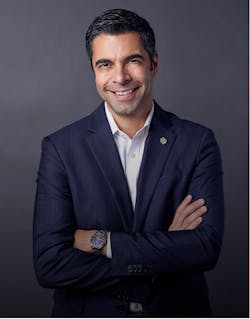Southfield, MI— Welcome back tax season! While most CPAs find themselves busy prepping corporate filings, one accounting firm advisor has been laser-focused on presenting resilient supply chain battle plans to the industry's leading manufacturers.
Jeff Jorge, leader of the automotive sector at Baker Tilly, views his team as the "accounting firm of the future" whose mission is to surpass the traditional entry points around tax planning and capital management strategies.
"There is so much that goes into making a business function at a world-class level," said Jorge in an exclusive phone interview with Aftermarket Business World from his office outside of Detroit. Protecting the value that Baker Tilly's clients have created in the market and further multiplying it into richer payoffs is just the starting point as Jorge guides them amid the uncertainty upended by the year-old pandemic recession.
Careful about prescribing one-size-fits-all remedies from offshore manufacturing to final mile delivery, Jorge takes a clear-eyed posture. Each business functions differently. And to that end, Jorge advocates for a supply chain model specific to a company's internal dynamics.
Two fundamentals stand out for this global thinker. First, managers should not discount the global impact on local trading areas. "In order to effectively manage a supply chain today, you have to be looking ahead," stressed Jorge. "Because whatever you're doing today is not reflective of what the future will necessarily look like."
Secondly, leadership in the human impact on the flow of goods preoccupies Jorge, which he keeps quiet about until the opportunity arises. When he can, he deftly broaches this topic— often at the end of most conversations or presentations— with certain industry bosses in mind who he perceives to rely heavily on the hard numbers. Inevitably should he break through, Jorge reminds the top brass to empathize with the job insecurity felt by middle management down to the blue-collar ranks as the nation worries about when the coronavirus vaccine will reach the entire population. "We've encouraged leaders to look into the lens of empathy because these are human beings who are scared," said Jorge.
An open environment, supported by the chain of command, increases the likelihood of building a robust supply infrastructure compared with "silos of excellence" that he shuns as counterproductive to cooperative growth. Increasingly across the industry, he observes, geo-political events from the past two years have inflamed global trade activity that has put pressure on production and transportation, the two drivers of fill rates. Senior managers, Jorge emphasized, who curtail unfiltered discussion about what is happening in the marketplace with their direct reports, cannot benefit from unlimited visibility outside of their corporate walls.
Jorge unabashedly advocates creating a safe space for employees to voice their findings and concerns without feeling reprimanded. Otherwise, who suffers? "You are as a leader robbing yourself the perspective on what the business needs to be worked on to stay afloat," said Jorge.
And as global trade mutates into new supply and demand channels, Jorge argues that shared mindfulness along the workforce ranks can quickly empower the decision-makers to gain better control over distribution operations.
Late in December 2020, at the Automotive Aftermarket Suppliers Association virtual conference, Jorge pressed this logic to the membership in a presentation titled, "Grab Your Slice of the OES Channel Growth." Typically, he lays out the transformation defined by five "guideposts" without revealing the underlying motive. The retooling of a resilient supply chain begins with full awareness of how unanticipated external events influence the local marketplace.
Stage two clarifies that competitive pressures, including trade wars and other "black swan" events, commonly set the stage for other manufacturers to inject more competition. Adding to the theory, Jorge said, "How do you take the information from outside your company and start weaving in the knowledge about your own business to make rapid decisions and planning?"
For a jarring effect, Baker Tilly purposely named step four “Supply Chain DNA Manipulation.” It ignites an uncomfortable metamorphosis from a reactionary to an anticipatory mindset. Radical changes occur. Old practices become displaced by new ones. Everyday routines practiced by white- and blue-collar workers cease to exist but convert into something else, which depends, Jorge says, entirely on the culture's personality. "When you transition to point four, it calls for order and restructuring things that a company hasn't touched in over a generation."
Sustainability, the final guidepost, powered by people, rides on data and planning that requires a hand-in-glove environment to develop, allowing the space where everyone interacts unconstrained by how they swap information.
But how realistic is this paradigm shift?
Optimistic, yes, but Jorge concedes that he is not naive to believe that any executive will freely accept this organizational human behavior model at face value to lift the enterprise. Added Jorge, "We can't force anything that a client of ours isn't willing to do themselves," who firmly contended that under a silo work culture, data and insights are unlikely to reach the top dog the way it would have been intended.
Peering beyond this year, Jorge expects more Fortune 500 company clients to emerge stronger and unlock serious gains. However, he kept tight-lipped about which ones inside the aftermarket ran ahead with Baker Tilly's advice.
Another reason for his optimism despite the limitations confronting a smaller company is that they possess the resources to overcome the same uncertainties faced by their bigger peers. As he frames navigating the pandemic economy, it's partially about scalability and how the supply chain points receive prioritization.
Searching for other tangible examples, Jorge asked, "How do you take what you need to be a world-class player? With the right support, the right structure, you can scale it to fit your business. Even from a budget perspective, you can elevate yourself to the performance of a Fortune 500."


